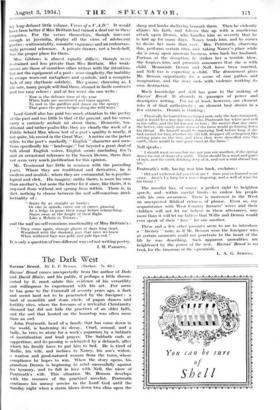The Dark West
Ravens' Brood. By E. F. Benson. (Barker. is. 6d.)
Ravens' Brood comes unexpectedly from the author of Dodo and David Maize, and his public, if perhaps a little discon- certed by it, must salute this evidence of his versatility and willingness to experiment with his art. For scene he has gone to the Cornwall of seventy years ago, a dark and secret land not to be penetrated by the foreigner : a land of monolith and stone circle, of pagan dances and fertility rites, where the fervours of a revivalist Christianity dimmed but did not hide the practices of an older faith, and the owl that hooted on the housetop was often more than an owl.
John Pentreath, head of a family that has come down in the world, is hastening its decay. Cruel, sensual, and a bully, he tries to atone for a week's paganism by a,Sabbath of mortification and loud prayer. The Sabbath ends at suppertime, and its passing is celebrated by a debauch, after which his family have to put him to bed. He is tired of Mollie, his wife, and inclines to Nancy, his son's widow, a wanton and good-natured woman from the town, whose compliance he hopes to win. When the story opens, his grandson Dennis is beginning to rebel successfully against his tyranny, and to fall in love with Nell, the niece of Pentreath's wife. This situation Mr. Benson develops with the resource of the practised novelist. Pentreath continues his uneasy service to the Lord God until the Stincray bight "when a storm blows down two elms upon the
sheep and lambs sheltering beneath them. Then he violently abjures his faith, and follows this up with a murderous attack upon Dennis, who handles him so severely that he is laid up for many days. Nancy tends him, and he comes to desire her more than ever. Mrs. Pentreath, observing this, performs certain rites, and, taking Nancy's place while she is away upon amorous business, wins back her husband. Furious at the deception, he strikes her a terrible blow. She forgives him, and presently announces that she is with child. Meanwhile Dennis and Nell have been married, and Nell too is expecting a child. The dblouement gives Mr. Benson opportunity for a scene of rare pathos and imagination, and the story ends with violence working its own destruction.
Much knowledge and skill has gone to the making of Ravens' Brood. It abounds in passages of power and descriptive writing. For me at least, however, one clement robs it of final authenticity; an element best shown in a few extracts. Dennis is thinking : "Physically he feared him no longer now, only the hate remained. and it would be a fine day when John Pentreath lay white and still in his coffin, and the lid was put on him : the sooner that day eame the better, else surely more acres of the farm would go hissing down his throat. He himself would he marrying Nell before long, if she had amind for him.whether the old folk dropped off °Hungered like rotting pears on the tree, and when they were shovelled into the earth, there would be rare good times at the farm."
Nell speaks :
" I should want no one but me, not you nor another, if the spring drove me out of doors of a night. There should be a wind and gusts of rain, and the earth drinking deep of it, and not a soul abroad but me."
Pentreath's wife, having won him back, exclaims :
"Old and withered did you think me ? Sure you've learned your error. Aren't I a harp for a man's fingering, and a well of wine for his thirst ? "
The novelist has, of course, a perfect right to heighten speech, and—within careful limits—to endow his people with his own awareness. There is moreover in the West an unexpected Biblical richness of phrase. Even so, my acquaintance with West Country farmers' wives and their children will not let me believe in these utterances, any more than it will let me believe that Willie and Dennis would ever speak of their " love " for one another.
These and a few other passages seem to me to introduce a " literary" note, as if Mr. Benson were the foreigner who at certain moments could not penetrate to the heart of the life he was describing. Such apparent unrealities are heightened by the power of the rest. Ravens' Brood is no book for the timorous or the squeamish. L. A. G. STRONG.






























 Previous page
Previous page